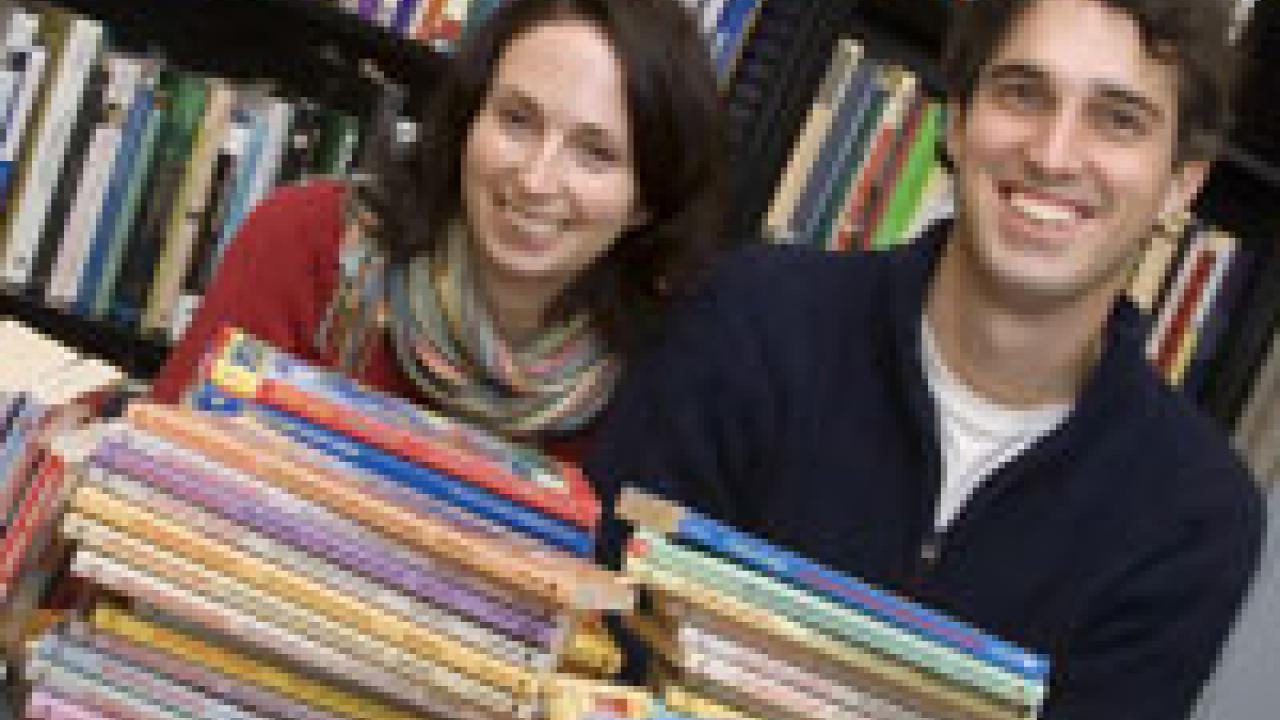There is more to Africa than monkeys and butterflies and rain forests. So, if you are a post-doctoral researcher there for months at a time, what else might you do?
How about taking on a community service project?
For UC Davis biologists Freerk Molleman and Malgorzata "Gosia" Arlet, that means setting up libraries and supporting a preschool, among other education efforts.
Soon Molleman and Arlet, who are married to each other, will be off on their second journey to western Uganda since becoming postdocs at UC Davis in May 2005. They do their research in Kibale National Park.
Just outside their field station gate is the village of Kanyawara, "and it's not possible to not have interaction with the people," Arlet said. Also, she and her husband work with field assistants who come from the village, "and we get invited to their homes and see their families."
"You just kind of get involved in the community," Arlet said during an interview in the lab that she and her husband share with entomology professor Jim Carey in the basement of Briggs Hall.
"Kind of get involved" is an understatement. In 2004, Arlet and Molleman started the Foundation for Children's Education in Uganda, a nonprofit, nonreligious, nonpolitical organization that sponsors four libraries (three with literacy classes) and a preschool, as well as English and sewing classes.
Recently, Arlet and Molleman sent off 20 boxes of donated books to Uganda, and the postdocs planned to send more before journeying there. The books go by ship, and are due to arrive in April or May, when Molleman and Arlet will be in the middle of their six-month stay.
The books, collected at the Davis Food Co-op, run the gamut from children's stories to young adult series to books for adults — nothing religious, nothing too racy, nothing too scary.
They are all in English — that is the national language of Uganda, a former British protectorate.
But Uganda also has 50 or so other languages, and not everyone speaks English. That is where the books come in, giving people something to help them with their English studies.
"It's kind of difficult to imagine," Arlet said, "but they didn't have any books, except for schoolbooks," which she described as very narrow in scope.
The children are eager to learn more, to know more about the world. "They really feel it's important for their futures," Arlet said.
Only some of the children will finish primary school, which is free, and fewer still — and only a small proportion of them girls — will go on to secondary school, which is not free. Arlet and Molleman said their foundation is providing scholarships for two girls, and the foundation will soon give out six more such scholarships.
The cost is about $300 per student for a year at boarding school.
The foundation's other bills come to about $250 a month, for rent for four libraries and salary of $30 a month for each of the four librarians, and a preschool for 40 children ages 3 to 6.
"With very little money you can make a lot of change," Arlet said.
Some times it takes no money at all. Arlet and Molleman sit down and read with children in the libraries on a regular basis. Each child reads a section of a story out loud, and around the circle they go. Story time does not stop when the postdocs are out of the country; English-speaking Ugandans are helping now.
Similarly, Arlet and Molleman have enlisted village volunteers to help run the foundation when the postdocs are out of the country, like now. They keep in touch with this foundation committee by e-mail and telephone.
Today, inspired by the foundation's work, Ugandans in the area are developing their own library plans. Arlet and Molleman plan to supply as many books as they can, while people in the community pay the library rent and the librarian salaries.
Arlet said she could not imagine working in a place like Uganda without doing something in addition to her scientific research. "You feel like you want to give something back," she said.
Arlet, 34, from Poland, and Molleman, 31, from the Netherlands, met in Uganda in 2001 and got married two years later. Arlet studies monkeys and Molleman butterflies, with both researchers focusing on biodemography — which has to do with species longevity, why some species live longer than others, why the males or females within species live longer.
Their community involvement began when Molleman's great-aunt donated money to the Kanyawara school. It is a six-room school with 100 children per room; in the newest classroom, the children had no place to sit except on the floor, so Arlet and Molleman decided to use his great-aunt's money to pay for benches with attached desks.
"Then we asked ourselves, 'What else can we do?'" Arlet said. The answer? Books.
Arlet said she grew up an avid reader in communist Poland. "We didn't have much opportunity to travel, so I loved to read books," she said.
Molleman sad he remembers reading about dinosaurs and mammoths as a child, "and getting a big bag of magazines from the World Wildlife Fund."
Now Arlet and Molleman see the same kind of enthusiasm in Ugandan children, like the 11-year-old girl who darted into the foundation's Kigarama library on opening day to borrow a math book — not necessarily a fun book to read, but an important volume nonetheless to this little girl.
"They really want to improve on their school grades," Arlet explained. "They are very serious about education."
And, who knows, maybe some day they will grow up to be scientists.
Media Resources
Clifton B. Parker, Dateline, (530) 752-1932, cparker@ucdavis.edu
